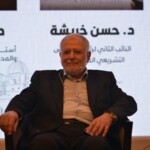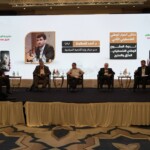Prof. Dr. Mohsen Mohammad Saleh, General-Manager of al-Zaytouna Centre for Studies and Consultations, presented a paper titled “Strategies for Exiting the Crisis of the National Project: Where is the Way Out?” at the second symposium “The Palestinian National Project: Impasse and Exit” of the Second Palestinian National Dialogue Forum. This event, organized by the Popular Conference for Palestinians Abroad, took place in Istanbul on 28-29/6/2024, and featured the participation of around two hundred Palestinian activists, intellectuals, parliamentarians, politicians and media professionals from both inside and outside Palestine.
In his paper, Saleh stated that the Palestinian leadership continues to promote the Oslo Accords as a viable path to peace settlement, despite more than thirty years since its signing, over twenty years since its failure, and its subsequent death and transformation into a carcass. He emphasized that, despite recognizing the error, the leadership persists in this approach.
Saleh highlighted two main points as an introduction to the paper. First, since the Oslo Accords, the Palestinian Authority (PA) has been structured to serve the interests of the occupation rather than the aspirations of the Palestinian people. It has become a facade for suppressing both the resistance movement and the Palestinian people. The peace process has been used as a deceptive path for further Judaization of the land and people, altering facts on the ground. Second, experience has shown that the current Palestinian leadership is not genuinely committed to any process that might diminish its control over the Palestine Liberation Organization (PLO) or the PA, regardless of how democratic and transparent such a process might be. There is a deliberate and conscious determination to circumvent the Palestinian popular will.
Saleh noted that the PA or the PLO leadership employs three tools to “terrorize the intellect” or act as deterrents to disrupt the Palestinian path; “The legitimacy scarecrow,” where despite being the entity that hijacks legitimacy and suppresses the Palestinian popular will, the PA accuses anyone attempting to put the Palestinian house in order of operating outside legitimacy; “The schism scarecrow,” where ironically, the PA itself is the primary cause of schism, having closed the doors of PLO and disrupted institutional work; and the “past or history scarecrow,” where the PA invokes its past actions to justify its current detrimental practices on the ground.
Saleh stated that this crucial work for Palestine is a matter of duty and responsibility. He emphasized that all efforts must be fully devoted to serving the Palestinian people, rather than merely taking symbolic stances. He further argued that Palestinian popular frameworks, prominent figures and skilled individuals should not passively await action from official Palestinian institutions or factional leaders. Instead, he called for the emergence of significant grassroots initiatives, the mobilization of Palestinian communities, and the enhancement of their capabilities. Saleh advocated for establishing Palestinian unity through unions, professional associations, and community organizations, with tangible results visible on the ground. He stressed the importance of promoting the formation of a national coalition or a broad patriotic front united on Palestinian fundamentals. This front should support resistance efforts, push for change, and advocate for transparent reform of Palestinian frameworks. Saleh also emphasized the need to press for a Palestinian transitional leadership, asserting that the current leadership is no longer capable of effectively guiding the Palestinian people. He concluded by urging all sincere individuals to collaborate on developing a consensual Palestinian national political program.
Saleh concluded that the gradual transition process must be serious and effective, with consensus being non-disruptive. He emphasized the importance of activating and empowering youth, ensuring they are given opportunities. Additionally, he stressed that any factional consensus must include all Palestinians and their energies, integrating them into the broader Palestinian context and moving away from factional quotas.






Leave A Comment